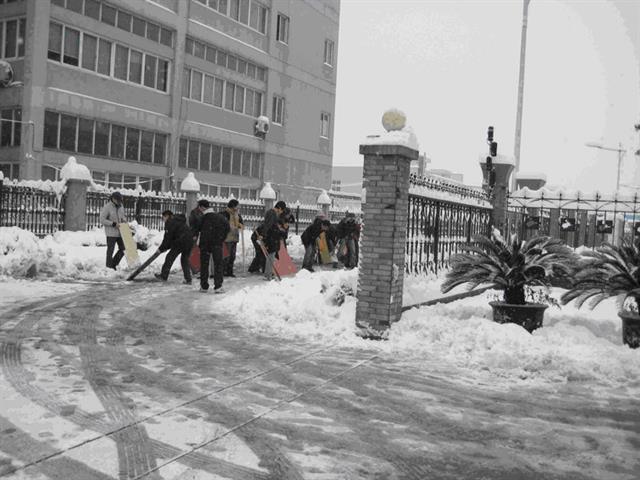 Staff cleaning up the snow at EP Equipment in Hangzhou |
By Paris Lord
China's forklift industry was hurt by snow storms in late January and early February that the government has called the worst in 50 years.
Nationally, more than 120 people died and losses were estimated at around CNY150 billion (USD21 billion). Worst hit were China's southern provinces, but the poor weather also belted central and eastern parts of the country. Snow and ice cut electricity supplies for weeks in some areas, with thick ice causing cables to snap and pylons to collapse.
Coal shipments to power stations were delayed by blocked roads and railways.
One major industry group representing forklifts says it is hard to estimate how many members were influenced.
"Generally, it didn't affect production of most of the companies, it only affected transportation," Zhang Jie, administrative vice secretary-general of the Industrial Truck Institution of China Construction Machinery Association, tells
Forkliftaction.com News. "They could not receive or deliver products when the roads became stuck."
He adds it was fortunate the snow storms occurred during the annual Spring Festival, or Chinese New Year holiday, when most Chinese head home for family reunions.
"Around that time, the plants were going to shut up shop for a while anyway," Zhang says. "Most of them took time off - say seven days or so."
The timing was also considered positive in Hangzhou, capital of the eastern province of Zhejiang, home to several major forklift manufacturers including Hangcha and EP Equipment.
Each January, EP alerts customers and dealers that orders received before Chinese New Year will be postponed about two weeks. This year, "we gave some extra notification, but they also saw the news on TV and elsewhere so they knew what the situation was and accepted this," says Sang Tian, general manager of the materials handling equipment division. She adds that while no company buildings were damaged, EP temporarily stopped production and stood aside staff.
Tian says the snow forced a 15-day lead time delay in February and monthly targets have been "hindered".
"We lost time, lost money because we could not come to work and production had to stop for a couple of days," she explains. "I think this happened to most of the factories in this area. But now, we've adjusted our working plan after that and the end of the Spring Festival (and) now, everything's caught up and there's no effects for April or for May and longer."
Snow crushed the roof of one building at Baoli Group, a forklift manufacturer based in eastern Jiangsu province.
"Luckily, we didn't have any more damage to personnel or production," says a Baoli spokeswoman, who adds that "some of the workers had a few days off".
Hefei Xieli Instrument Manufacture Co, based in central Anhui province, reported logistics problems for clients which included major Chinese forklift brands.
"Suppliers could not deliver goods to us at the time agreed, and our clients did not receive their orders in time," says Zhu Hongfei, marketing and operational department manager.
Whitegoods giant Haier in the eastern port city of Qingdao reported that one of its warehouses was damaged by snow. Forklift maker Linde (China) sales and service people acted very quickly and efficiently to solve the problems for their customer.
A few Linde forklift shipments were slightly delayed from its headquarters in Xiamen, south eastern Fujian province, but customers well understood it was because of force majeure.
Li Xia, assistant general secretary of the China Logistics Association, believes lessons can be learned from the experience. These include ensuring pipes in southern China are laid deeper underground to withstand winter, as they are in the north.
Also evident was a deficit of preparation, such as better forecasting technology by the Central Meteorology Administration, that could have lessened the damage.
Li thinks the "snow havoc", as state media called it, could be an "alarm" to Chinese to "rethink" their systems and change the way some things are done. People could "be more visionary and humble," he says. "I remember several decades ago we had a similar natural disaster, but somehow people just assume it won't happen again. This is one of the reasons we suffered that much."